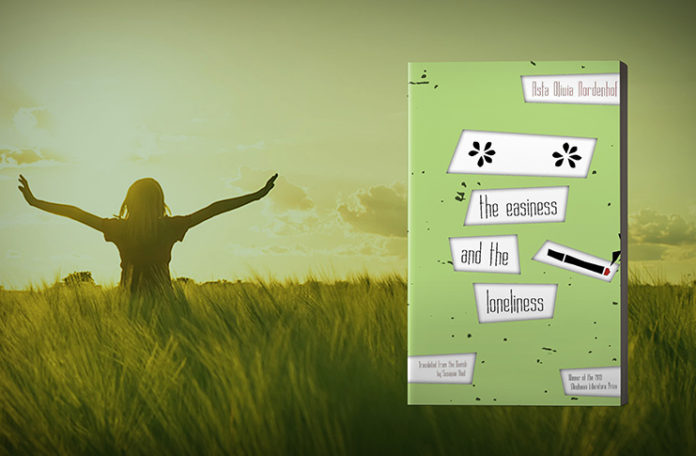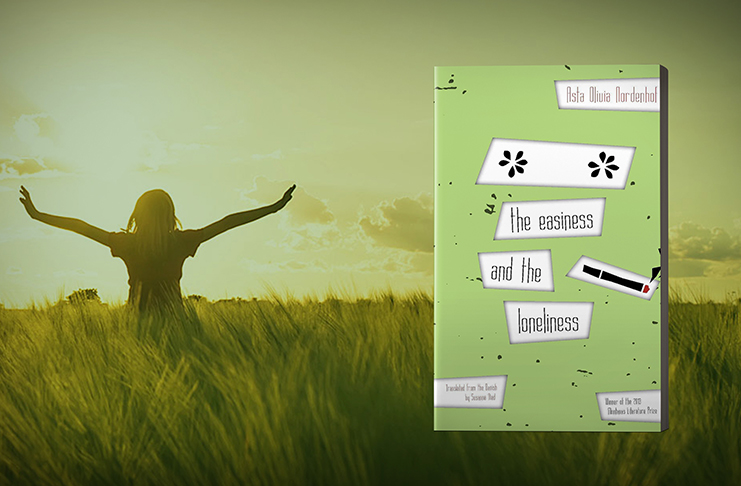the easiness and the loneliness
by Asta Olivia Nordenhof (translated from the Danish by Susanna Nied)
Publisher: Open Letter (2018)
“all the love I have can fit into an elderberry”
To be able to sit down on a familiar sofa, the one with fluffs of cotton sticking out at the edges like astringent whiffs of memory, and to be able to have a conversation with yourself as a light pasty breeze fills you up and opens you up in turn, is to be able to hear the easiness and the loneliness of this collection of poems. The incredible feat here is exactly that – the physical and the personal come together to create a devastating effect – something that the reader never quite recovers from. Each poem runs through the page, almost dripping off the edges, heedless of what may happen if it does. This physical overture creates a false sense of fluidity, a state of almost happiness, hushed energy that takes control of you just as you take control of the poem.
“now i happen to think of something funny
a dried rose hanging in my teenage room
we were on a field trip during our confirmation class and the boys bought roses for all the other girls. the pastor tried to lighten the situation by buying one for me.”
What makes Asta’s writings a formidable force to reckon with is the sheer nakedness of this conversation with oneself, a no-holds barred juggernaut steamrolling its way through, never fearing, never evading the past. Characterized by flashbacks that careen from one dizzying moment in the near past to a faint glimmer in a distant fog, Asta does not write a poem. She is incapable of fastening the seatbelts. She is incapable of restraint and she is incapable of creating a sculpture. What she is capable of and, in fact, highly adept at is taking a certain moment in the past, pinning it down on the floor and tearing through its innards, as if this very act of velocity would help her rip apart every unresolved sentence, every unexpected blip on the radar and every breath that was out of turn until all of it, the entire phantasmagoria, became a little less real and a little more poetry.
“your mother trips over the coffee table,
afterward she lies for a long time with her
head in your lap. i can see that you wish i
werent here”
“once i killed a kitten
threw it against a wall because it wouldnt
suckle at my child-breast
im mad
at myself, at the whole suburb called gentofte”
The entire collection strikingly reminds me of the garden – the garden of eroticism and the garden of quiet contemplation. Despite the energy throughout and despite the maddening movement of images, one finds the fruits of a garden rearing their heads throughout the story of this body. Once in a while, one finds a plum or a “nubbly strawberry” and, at that very moment, the rush stops, the agenda is shelved and the breath is held in quiet reverence as the fruit grows into the body and stands on the page exhibiting itself – vivid and lonely but essential to the plotline.
“the inviolability of this tomato, whether or
not its whole: meaningless and silent
on the cutting board still for thought”
This is what I find most fascinating about this body of work. It is easy to say that this book is more than a collection of poems. But sometimes, even that, is a hard-won battle. Asta’s journey is not merely an attempt at confronting the undulating topographies of her past. It is a controlled effort at reconciling the sheer physicality at stake – a physicality that does not diminish with time.
“everyone at some point has been so hot and
then rested their thighs against rocks that
have been in the shade all day
everyone has been so marvelously little”
“i dont want to shine in my own corpse anymore
i dont want to be a lonely god”
Be that as it may, this book of poetry not only displaces the reader, it offers up the elderberry for a brazen and intimate display of the poet’s conversation with herself.






RELATED ARTICLESMORE FROM AUTHOR
Lost, Hurt, or in Transit Beautiful
Adam
A Full Circle